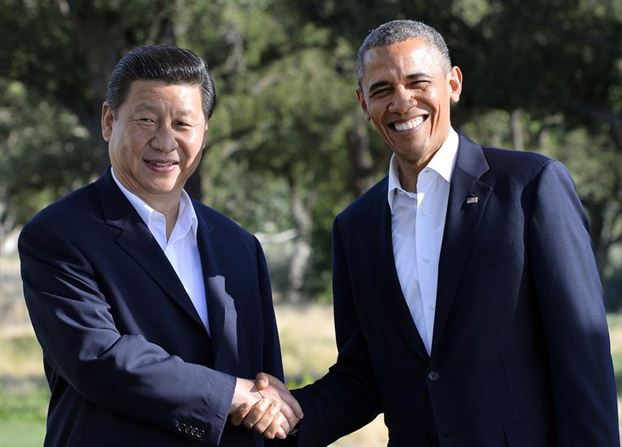
President Barack Obama and Chinese President Xi Jinping at the Annenberg Retreat at Sunnylands near Palm Springs, California, on June 7, 2013. Image: MSN
It’s been a busy week for the United States regarding engagement with Asia; President Barack Obama and Chinese President Xi Jinping concluded a two-day meeting — or “summit” with a small “s” — at Sunnylands, the former Annenberg Estate in California. This came after the Shangri-La Dialogue in Singapore, and both events signify that U.S. engagement and leadership on issues concerning Asia remain top of the agenda for this administration.
Early reports indicate that the Obama-Xi meeting reached the objective it was intended to do, giving both leaders face-to-face time in an informal, more relaxed setting for laying out a macro plan or “skyline view” for U.S.-China relations. This meeting was not designed for big policy announcements or big deliverables, though there is a press release on U.S.-China cooperation on climate change. Rather, it was a time for both leaders to have quality time together and listen to each other. Convening this meeting seems like a good move by both parties; prior to this meeting both presidents would have had to have waited until the more time restrained and formal setting of the G-20 Leaders’ Summit in September. This opportunity for both men to meet one-on-one is a win-win situation for both sides.
Few question that there are serious issues of concern in the U.S.-China relationship amidst growing signs of mutual mistrust on a whole range of issues, both bilateral and global, from cyber security intrusions, China’s growing assertiveness regarding territorial issues around its periphery, the U.S. rebalance to Asia, to concerns of a global nature regarding North Korea and Iran’s development of nuclear weapons, to the civil war in Syria, and climate change. In his meeting with retiring national security advisor Tom Donilon in May, President Xi described Sino-U.S. relations at a “critical juncture” and he called for a “new type of great-power relationship.”
Last week it was Secretary of Defense Chuck Hagel’s attendance at the annual Shangri La dialogue that was making news on Asian issues, though by all accounts it was Nguyen Tan Dung, Prime Minister of Vietnam, and his keynote address that set the tone for the event. Prime Minister Nguyen, without mentioning China, stated that “big states have a greater role to play and can contribute more, but they should also shoulder bigger responsibilities in the cultivation and consolidation of such strategic trust.”
Basically, he was highlighting the unease and tensions in the region regarding China’s position on territorial disputes in the South China Sea with Vietnam, the Philippines and Malaysia, to the Senkaku/Diaoyutai islands in the East China Sea with Japan, and a border dispute with India where last month there were reports of the Chinese military setting up camp inside India’s side of the border. It is worth pointing out that India retaliated against Pakistan back in 1999 for a very similar reason, resulting in the Kargil War.
For his part, Secretary Hagel went into great detail on how the United States intends to remain engaged within the Asia-Indo region. This was Secretary Hagel’s first visit to Asia since becoming secretary of defense, though he is no stranger to the region. His father fought in World War II in the Pacific theater, and Secretary Hagel, alongside his brother Tom, is a Vietnam veteran and decorated war-hero; Secretary Hagel carries shrapnel from that war in his body to this day. In addition, then-Senator and member of the Foreign Relations Committee Hagel was instrumental in establishing the Shangri-La Dialogue in 2002 when he was approached by the current IISS Director-General John Chipman to speak at the inaugural Shangri-La Dialogue, a role that he repeated again in 2003.
In his speech, Secretary Hagel went point-by-point through the military steps the United States is taking with each ally and partner in the region as part of the US rebalance to the region. He specifically singled out China on the issue of cyber security when he stated that “The United States has expressed our concerns about the growing threat of cyber intrusions, some of which appear to be tied to the Chinese government and military.” However, he also highlighted the fact that the U.S. rebalance to Asia is more than just military, it is an across the government approach. In his words, “America is implementing a rebalance – which is primarily a diplomatic, economic and cultural strategy.”
The overall picture from analysts who were present at the Shangri-La Dialogue is that there are tensions and real concerns in the region. Turn back the clock one hundred years to 1913, and few in Europe saw the advent of World War I, yet it happened; and according to Thucydides, the Peloponnesian War evolved because of the “Spartans’ fear of the growing power of Athens that made war inevitable.” If structures are in place, miscommunications are made, and leaders do not communicate clearly to each other and their respective administrations, events can take a sudden turn for the worst. By all accounts, the Obama-Xi meeting was convened with this in mind and to avoid such a scenario. From the perspective of the United States, the future direction of cyber security related issues will be one very prominent benchmark for evaluating the bilateral U.S.-China relationship.
Damien Tomkins is Project Assistant at the East-West Center office in Washington, D.C. where he contributes research and content to the Asia Matters for America initiative and coordinates the Asia Pacific Bulletin publication series. The views expressed here are solely those of the author and not of any organization with which he is affiliated.